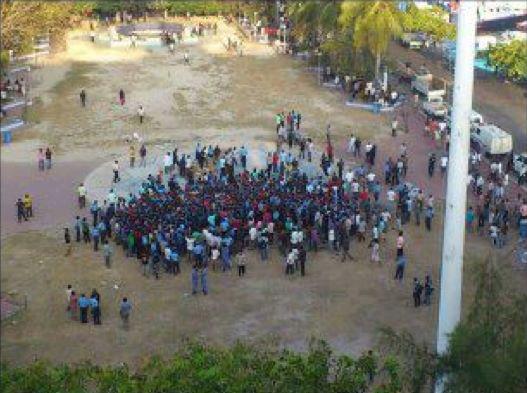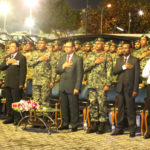Politics
Failed coup in Turkey reignites debate about Feb 7
A failed coup attempt by a faction within the Turkish military Friday night has reignited fierce debates among Maldivians on social media about the controversial transfer of power on February 7, 2012.
Published
8 years agoon

A failed coup attempt by a faction within the Turkish military Friday night has reignited debates among Maldivians on social media about the controversial transfer of power on February 7, 2012.
The resignation of former President Mohamed Nasheed in the wake of a violent mutiny by Specialist Operations police officers and elements of the military remains a polarising subject more than fours years later.
Nasheed said he resigned under duress in order to protect his family and prevent bloodshed, but a Commonwealth-backed Commission of National Inquiry later concluded that the transfer of power to his deputy was constitutional.
As the coup attempt in Turkey unfolded, Maldivians took to social media to reminisce and draw parallels between the events of February 7.
Early on Saturday morning, Defence Minister Adam Shareef Umar stirred controversy with a tweet implying that Nasheed resigned in a coup d’etat.
“Cannot accept a coup from any group in anywhere. Turkey is suffering,” he tweeted, prompting a question about February 7.
@pax_pack I did not encourage that either.
— Adam Shareef Umar (@Adamshareefz) July 16, 2016
Shareef’s response was widely reported in local media.
In a tweet last night, Nasheed meanwhile stood by his decision to not use lethal force against the mutinying police and soldiers. He expressed the same sentiment on Facebook, eliciting varied responses.
Turkey aborted coup attempt at expense of more than 100 lives. Thankful again we chose not to open fire on 7 Feb 2012 to control #mvcoup
— Mohamed Nasheed (@MohamedNasheed) July 16, 2016
According to then-Brigadier General Ibrahim Mohamed Didi, Nasheed refused to consider his repeated advice to use gunfire to disperse the crowd gathered at the Republic Square.
The report by the Commission of National Inquiry also noted that Nasheed had the constitutional authority to order the use of force.
“He chose not to. That decision may be classified as praiseworthy, but he cannot now contend that because he made those choices, that he was ‘forced’ into resigning because of what others were doing around him,” the commission said.
Responding to Nasheed’s tweet, former Home Minister Umar Naseer insisted that “there was no coup” as the former president had resigned on live television.
Pro-government supporters meanwhile accused Nasheed of being “intoxicated” when he made the decision. Others repeated allegations of the ousted Maldivian Democratic Party government’s “secularisation” agenda.
Because there was no coup in the Maldives on the 7th Feb. Resigned voluntarily in front of LIVE media. https://t.co/TwrwQ1CmJt
— Umar Naseer (@UmarNaseerPPM) July 16, 2016
Nobody wud have followd your orders that day.Along with police even the defence forces were trying to get rid of you https://t.co/btFRdjRMU2
— Ahmed Nasheed (@TC_Dav) July 16, 2016
@MohamedNasheed the truth is he was high as hell when he resigned! Next morning he even started getting ready for work!! #Annism #Failed
— Humainee (@MuhammadHumainy) July 16, 2016
At a rally a few days after the transfer of power, Umar Naseer had claimed that he warned the president’s closest aides that Nasheed could “lose his life” if he did not comply with the ultimatum to resign.
Naseer said he told the president that he could “either surrender with bloodshed or surrender peacefully”.
Naseer also told Australia’s SBS Dateline programme that he was organising the protests from a “command centre” and that he feared for Nasheed’s life.
In January 2013, Naseer said the transfer of power was the result of “planning, propaganda and a lot of work.”
On the morning of February 7, Nasheed was trapped inside the headquarters of the Maldives National Defence Force.
After soldiers were pegged back and forced inside military headquarters following a confrontation with the mutinying police, the Republic Square – or the “green zone” where gatherings are prohibited – was overrun by opposition supporters and police officers.
Two hours before Nasheed’s resignation, soldiers and police took over the state broadcaster.
On the previous night, violence had broken out between opposition protesters and MDP activists at the artificial beach in Malé after both the riot police and soldiers were ordered to withdraw.
The SO officers then broke the chain of command, assaulted pro-government supporters, and ransacked the MDP meeting hall.
The mutiny by the SO officers followed three consecutive weeks of protests over the controversial military detention of the criminal court’s chief judge.
In March last year, Nasheed was found guilty of ordering the “abduction” of the judge and sentenced to 13 years in prison.
The opposition leader’s jailing drew widespread international condemnation and triggered a prolonged political crisis.
Nasheed has since been granted asylum in the UK after he was authorised to travel for medical treatment.
The circumstances of Nasheed’s resignation also divides opinion among MDP supporters, with some arguing that it could have been avoided and others lauding the decision.
@MohamedNasheed Wen I knew u were going2 ArmyHQ at dawn, I textd u saying “pls don’t escalate” n u promptly replied u will not. Tks so much.
— Ahmed Shaheed (@ahmedshaheed) July 16, 2016
@MohamedNasheed Did u know that in 7/02 police was force to side with the opposition protestors after pro govt supporters attacked them.
— abdullahraheem (@abdullahraheem) July 16, 2016
@MohamedNasheed if Turkey president had followed ur steps, it would have cost more lives. U saw coup coming, but it was a surprise 4 Erdogan
— Amjad Thaufeeg (@AmjadMV) July 16, 2016
@sipadmohd @AmjadMV How do you know that this coup went off Erdogan’s radar? Judging by 1000s detained overnight, it didn’t @MohamedNasheed
— MushfiqueMohamed (@mushfique_) July 16, 2016
@AmjadMV intel or no intel how to prevent an army that wanted its old powers back? Police? @sipadmohd @mjunayd @MohamedNasheed
— Munshid (@dyingregime) July 16, 2016
@MohamedNasheed in case you aren’t aware, most of the key people who staged the coup are with you now. Explain that!
— Rishwan Jalyl (@yvaiwhy) July 16, 2016
You chose to be a coward, and did not allow the Patriots like @ibrahimmdidi to save the nation.
You failed us.
— i am a Terrorist. (@Gahbaru_Singh) July 16, 2016
We respect that. Violence has no place. We will continue our struggle peacefully and don’t want to loose a single life. @MohamedNasheed
— #FreeRaeesNasheed (@JamharAhmed) July 16, 2016
@MohamedNasheed Commander in Chief has to take difficult decisions, force has to be used when required and this was such a time.
— Dhivehi Justice (@DhivehiJ) July 16, 2016
@MohamedNasheed thank you sir. Your a great hero
— Thoha Ali (@ThohaAli) July 16, 2016
@MohamedNasheed hope it was done out of conviction rather than fear and the fact you had no moral authority over them at that point in time
— DrKarusathu Md Ahmed (@Karusathey) July 16, 2016
@MohamedNasheed pic.twitter.com/Z4qSViSFAy
— magey raajje (@huththu) July 16, 2016
@aishathalinaaz yes on the very next day his supporters walked behind them and were beaten brutally
— Ibrahim Mohamed (@shuibs) July 17, 2016
So lets say there was bloodshed and MDP still lost. Supreme Court would have hanged PN for murder already.
— fazail lutfi (@fazaillutfi) July 16, 2016
Difference between 🇲🇻 coup & 🇹🇷 coup is, political leaders led coup in 🇲🇻 while there was no political leaders involvement in 🇹🇷 coup.
— Rishvan (@iamrishvan) July 16, 2016
the coup was live on media too dont u remember umar burning mdp haruge hijacking the public media want to c ? https://t.co/bKJfr1Kq63
— Mutti (@getmutti) July 16, 2016
Truth is we want it all. We want kind (hihthiri) but we want an ironfist (dictator) too. Want progress but want status quo too. Us humans. 😔
— Zuroo (@zuroo) July 16, 2016
The only person who ever resigned from power in The Maldives for the sake of the nation is @MohamedNasheed . Fact. https://t.co/v9EL7yUZyC
— Ibra (@ibramandhu) June 30, 2016
Related Posts
 Chaos islands
Chaos islands Defence minister warns of plot to destabilise Maldives
Defence minister warns of plot to destabilise Maldives Opposition MPs want Maldives defence minister questioned over Facebook post
Opposition MPs want Maldives defence minister questioned over Facebook post In leaked audio, defence minister vows to seek charges against lawmakers
In leaked audio, defence minister vows to seek charges against lawmakers Anti-India protest blocked
Anti-India protest blocked On anniversary of 1988 coup, Maldives threatened by ‘secularism and extremism’
On anniversary of 1988 coup, Maldives threatened by ‘secularism and extremism’
You may like
-


Maldives Independent suspends operations
-


EPA rejects Maafaru runway expansion project
-


Infrastructure development pushing islands to ‘tipping point’
-


Military alert level raised as ‘precautionary measure’
-


Taxi driver was fatally stabbed during robbery
-


Arbitration case filed in Singapore over Fushidhiggaru lagoon

Maldives Independent suspends operations

Iyaz on Female Circumcision

EPA rejects Maafaru runway expansion project

Infrastructure development pushing islands to ‘tipping point’


